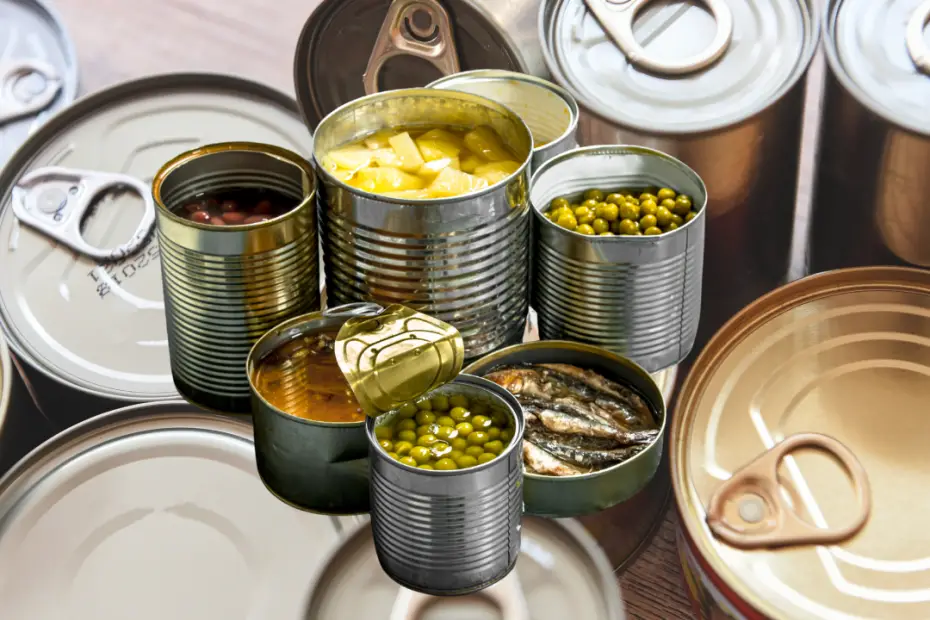Canned food is a convenient and long-lasting option for many households. However, it’s important to be cautious when it comes to consuming food from dented cans. The structural integrity of the can is crucial for maintaining the safety and quality of its contents. Here are several reasons why you should avoid eating canned food from dented tins.
1. The Risk of Botulism
One of the most serious risks associated with dented cans is botulism, a rare but potentially deadly form of food poisoning. Botulism is caused by the bacterium Clostridium botulinum, which produces toxins in low-oxygen environments like canned foods. When a can is dented, especially along the seams, it can compromise the airtight seal and allow bacteria to enter and grow. The USDA warns that botulism can attack the nervous system and be fatal (source). This risk applies to all types of canned food, including meat in cans, fish in cans, vegetables in cans, and mushrooms in cans, among others.
2. Compromised Seals
The seams of a can are its most vulnerable points. A dent on the seam can break the seal, allowing air and bacteria to enter the can. This can lead to food spoilage and contamination. According to the USDA, any can with a deep dent on any seam should be discarded (source).
3. Air and Moisture Exposure
Dents can also cause tiny punctures or breaches in the can’s exterior, which may not be immediately visible. These breaches can allow air and moisture to enter, creating an ideal environment for bacteria to grow. This can result in foodborne illnesses if the contaminated food is consumed (source).
Commonly Asked Questions
Q: Can I eat food from a can with a small dent?
A: While small dents away from the seams are generally less risky, it’s still best to inspect the can carefully. If the dent is shallow and the can is otherwise in good condition, the food may be safe to eat. However, if you have any doubts, it’s better to err on the side of caution (source).
Q: What should I do if I accidentally eat food from a dented can?
A: If you accidentally consume food from a dented can and experience symptoms like nausea, vomiting, dizziness, or difficulty breathing, seek medical attention immediately. These could be signs of foodborne illness, including botulism.
Q: Are there any visible signs that a dented can is unsafe?
A: Yes, cans that are leaking, bulging, or have deep dents, especially on the seams, should never be used. Additionally, if the contents have an off odor, unusual color, or milky liquid, discard the can immediately (source).
Long-Term Storage Concerns
Canned goods are often stored for long periods, sometimes in less-than-ideal conditions. Over time, even minor dents can worsen, further compromising the can’s integrity. This makes it essential to regularly check your pantry for any damaged cans and dispose of them properly.
Safe Handling Practices
To minimize the risk of dents, handle canned goods with care. Avoid dropping cans or stacking them in a way that could cause damage. When purchasing canned food, inspect each can for dents before adding it to your cart.
Alternatives to Dented Cans
If you encounter a dented can, consider returning it to the store or replacing it with an undamaged one. Many stores will exchange dented cans for new ones. Additionally, consider using fresh or frozen alternatives when possible, as these options do not carry the same risks as canned foods.
Conclusion
While canned foods are a practical and economical choice, it’s crucial to ensure they are stored and handled properly. Dented cans pose significant health risks, including the potential for botulism and other foodborne illnesses. By being vigilant and cautious, you can protect yourself and your family from these dangers.
Remember, when in doubt, it’s always safer to discard a dented can than to risk consuming potentially contaminated food. Your health and safety are worth more than the cost of a can of food.
